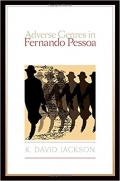
Poet, short-story writer, feverish inventor–Fernando Pessoa was one of the most innovative figures shaping European modernism. Known for a repertoire of works penned by multiple invented authors–which he termed heteronyms–the Portuguese writer gleefully subverted the notion of what it means to be an author. Adverse Genres in Fernando Pessoa offers an introduction to the fiction and the “profusion of selves” that populates the enigmatic author’s uniquely imagined oeuvre.
To guide readers through the eclectic work fashioned by Pessoa’s heteronyms, K. David Jackson advances the idea of “adverse genres” revealing genre clashes to be fundamental to the author’s paradoxical and contradictory corpus. Through the invented “coterie of authors,” Pessoa inverted the usual relationships between form and content, authorship and text. In an inspired, paradoxical, and at times absurd mixing of cultural referents, Pessoa selected genres from the European tradition (Ricardo Reis’s Horatian odes, Álvaro de Campos’s worship of Walt Whitman, Alberto Caeiro’s pastoral and metaphysical verse, and Bernardo Soares’s philosophical diary), into which he inserted incongruent contemporary ideas. By creating multiple layers of authorial anomaly Pessoa breathes the vitality of modernism into traditional historical genres, extending their expressive range.
Through examinations of “A Very Original Dinner,” the “Cancioneiro,” love letters to Ophelia Queirós, “The Adventure of the Anarchist Banker,” Pessoa’s collection of quatrains derived from Portuguese popular verse, the Book of Disquietude, and the major poetic heteronyms, Jackson enters the orbit of the artist who exchanged a normal life for a world of the imagination. (Source: Amazon)